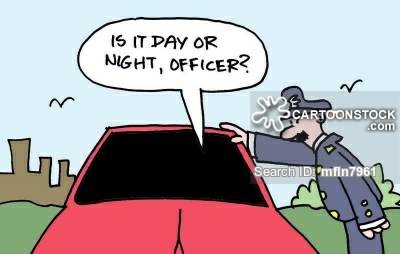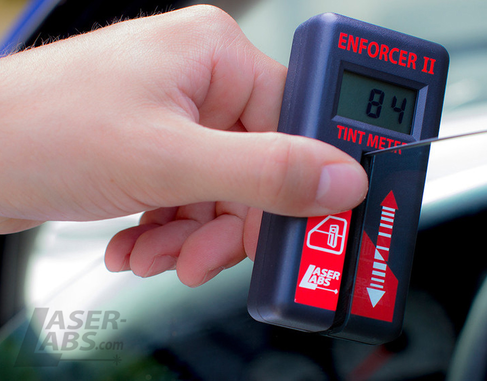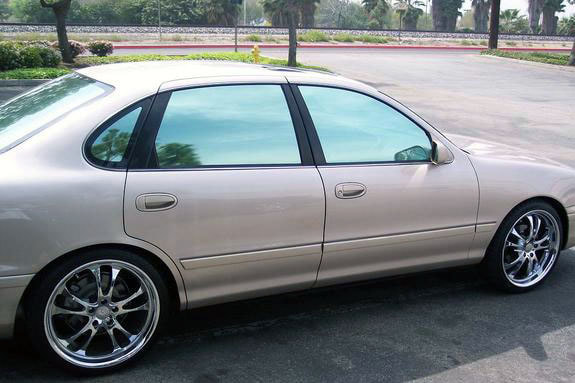|
Most of us love our vehicles with nicely tinted windows - for some of us - the darker the better. We also know if our windows' tint is too dark it's bordering on being illegal.
But how dark is too dark? How dark is a vehicle’s tint actually allowed to be in Trinidad & Tobago?
In the past, how dark your tint was permitted to be was very subjective as there was no specific measurement set out in the legislation. The law left it up to the opinion of the officer in determining whether the tint on the window obscured the view of the inside of the vehicle. As you can surely imagine, this methodology was problematic as different officers may have different opinions on obscurity. Fortunately, the law has since changed. On the 31st of July 2020, under section 100 of the Motor Vehicles and Road Traffic Act, the Minister of Works and Transport made the Motor Vehicles and Road Traffic (Windscreen and Window Tint) Regulations, 2020. The Regulations now set out specific measurements of visible light that must pass through the glass of a vehicle, including any tint affixed to the glass for it to be considered legal.
According to Regulation 11, the visible light transmittance of a windscreen or window of a vehicle must be measured by a constable in uniform using a light transmittance measuring device approved by the Licensing Authority.
According to Regulation 3: "3. (1) A person shall not cause or permit a vehicle to be used, or drive or have charge of a vehicle, upon any road where a windscreen or window of the vehicle is composed of, coated or covered by, or treated or darkened with, any material, overlay or other product, that has the effect of making the windscreen or window non-transparent or reducing the visible light transmittance of the windscreen or window unless– (a) the front windscreen has a visible light transmittance of at least seventy percent; (b) each front window, including any side wing and side window, on either side and forward of the vertical plane immediately behind the driver’s seatback in its rearmost and upright position, has a visible light transmittance of at least thirty-five percent; and (c) each rear window, including any side window behind the front window and the rear windscreen, has a visible light transmittance of at least twenty percent. (2) Subregulation (1) does not apply where the material on the windscreen or window was installed by the manufacturer of the vehicle and approved by the Licensing Authority. (3) Notwithstanding subregulation (1), the front windscreen of a vehicle may have affixed to its top, along its width and in such a position as not to interfere with the vision of either the driver, or a passenger carried in the front seat, a band of material or an anti-glare band overlay– (a) which– (i) measures in width from the top of the windscreen, no more than fifteen centimetres or six inches; or (ii) in the case of a vehicle above Class 3, covers an area above the highest point of the windscreen that is swept by a windscreen wiper; and (b) which has a visible light transmittance of at least thirty-five percent. (4) A person who contravenes subregulation (1) commits a traffic violation and is liable to a fine of five thousand dollars ($5000TT). This means that if you have a tinted window in your vehicle that fails to have the minimum percentage of visible light transmittance as required by the Regulations, you would commit a traffic violation and be liable to a fine of $5000TT.
There is also prohibition against the use of reflective material on the windscreen or window of a vehicle.
Under regulation 4 it states: "4. (1) A person shall not cause or permit a vehicle to be used, or drive or have charge of a vehicle, on any road, if a windscreen or window of the vehicle is composed of, coated or covered by, or treated with, any material, overlay or product, that has the effect of making the windscreen or window appear to have a metallic, reflective or mirrored effect sufficient to dazzle motorists. (2) An owner, driver or operator of the vehicle shall ensure that no windscreen or window of the vehicle has– (a) scratches or other defects that unreasonably impair the driver’s vision through, or unreasonably compromise the strength of, the windscreen or window; (b) laminated glazing or glass that shows signs of discoloration that unreasonably impair the driver’s vision through the windscreen or window; or (c) material with any bubbling or other defects that unreasonably impair the driver’s vision through the windscreen or window. (3) A person who contravenes this regulation commits a traffic violation and is liable to a fine of one thousand dollars ($1000TT)." There are also exceptions to the rule. According to Regulation 6: 6. (1) Regulations 3, 4 and 5 do not apply to the following: (a) a person who is issued an exemption certificate on medical grounds under regulation 7 in respect of a vehicle; and (b) any of the following vehicles which the Licensing Authority exempts, having regard to the use of the vehicle or the safety of its occupants: (i) any motor vehicle which is the property of or used by the President in his official or personal capacity; (ii) any motor vehicle which is the property of or used by the Prime Minister in his official or personal capacity; (iii) an ambulance registered under the Emergency Ambulance Services and Emergency Medical Personnel Act; (iv) any vehicle which is the property of or used by– (A) the Police Service; (B) the Fire Service; (C) the Prison Service; (D) the Defence Force; (E) the Customs and Excise Division; (F) the Strategic Services Agency; or (G) a protective service agency within the meaning of section 2 of the Supplemental Police Act; (v) a body transfer vehicle which is the property of and registered for use by an undertaker or funeral home; or (vi) any other vehicle authorised, in writing, by the Licensing Authority.
Important Notice: This post does not constitute legal advice. Always consult with an attorney on any legal problem or issue.
This website is managed by AURORA Chambers; a law practice in Trinidad and Tobago. Click HERE to receive updates straight to your inbox by subscribing to our newsletter.
2 Comments
25/10/2023 02:06:56 am
Thank you for the detailed information on the regulations surrounding vehicle tinting in Trinidad and Tobago. It's clear that there are specific measurements and standards set to ensure safety and compliance. I'm curious, have there been any recent changes or discussions about further amendments to these regulations?
Reply
Leave a Reply. |
Categories
All
Archives
June 2024
|
LawForAllTT.com |
|






 RSS Feed
RSS Feed